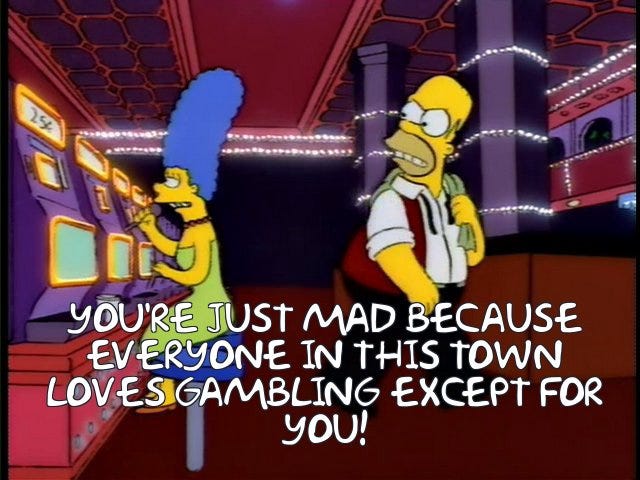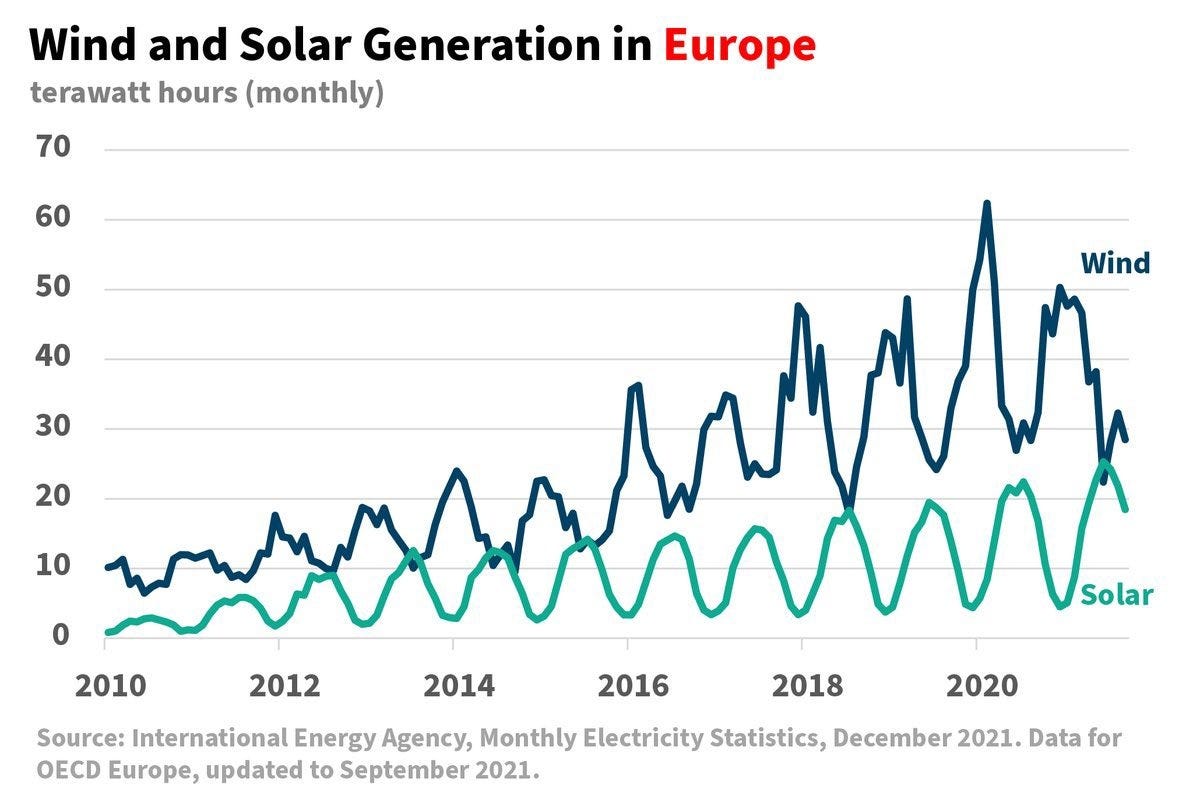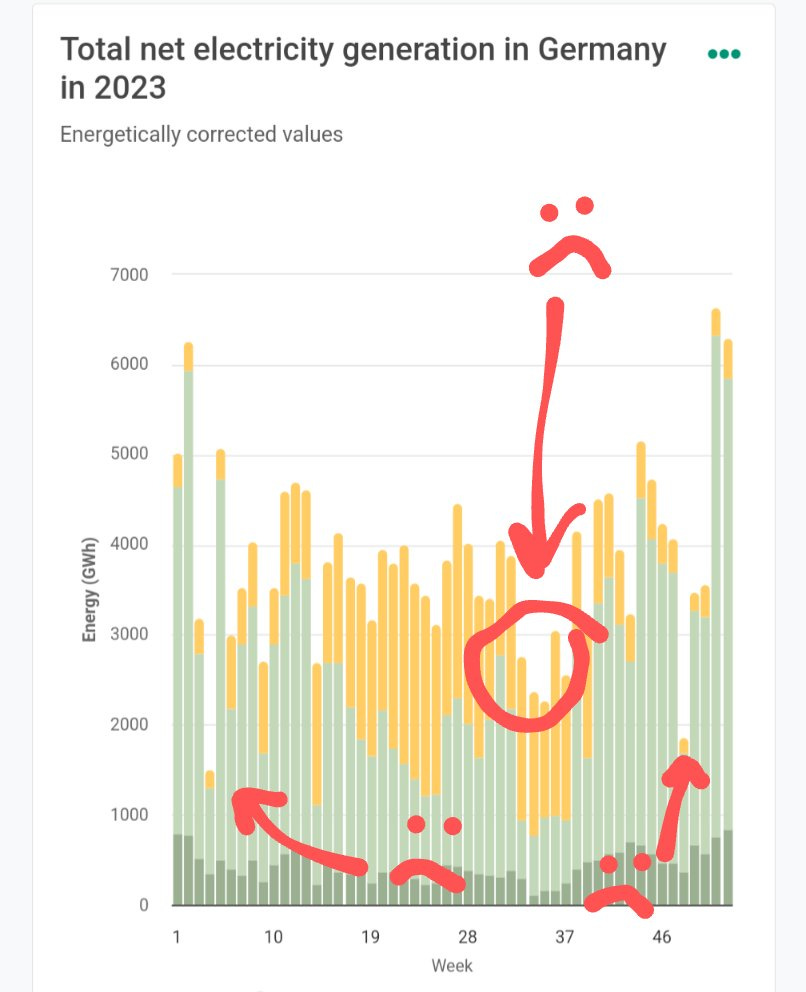This is the moment I knew I could never step foot into a casino without getting fleeced by my own brain: a psychologist was on the radio explaining the cognitive difference between those likely to become addicted to gambling and normal people.
Say you’re at a slot machine, she told the interviewer, and you pull the lever. The wheels spin and then stop: you see two 7’s and a cherry.
If you’re normal, you say, “Aw man, I lost.”
If you’re pre-disposed to gambling addiction, you say, “I almost won!”
That’s when I knew. Because I said out loud to myself in the car, “That’s because you did almost win!”
Intellectually, like a normal person, I understood that a loss is a loss, but in some twisted corner of my brain, a small, forceful voice said, “But…two 7s…that’s almost there…”
This is how most pro-renewable energy modelers think.
Let me explain.
Over the last week or so, I saw this graph making the rounds, accompanied by a similar comment: “Wow, wind and solar seasonally balance on the grid. This is great news!”
And don’t they have a point? See how at the monthly level, whenever wind dips, solar rises, and vice versa? Maybe Europe just needs more wind and solar! Maybe if we can build the right models we can figure out how to get there!
But let’s take a closer look at Germany.
Notice where both wind and solar fail. At those moments, you’ll need full back-up, which means you’ll need capacity at least equal to demand in those moments to make it through random moments of renewable failure. Or else, blackouts.
Thus, the dream of seasonal balancing is two 7’s and a cherry—“almost” but actually “not at all.”
So, how do smart people get captured by this perspective? Maybe, like me, they have a slightly broken brain. And while that could be the case, I don’t think that’s a sufficient explanation. Instead, I think some well-meaning, intelligent people fall into this trap for a series of interconnected reasons:
They believe not just that they are smart, but that being smart makes them good people.
Deploying their smarts on a problem like decarbonization allows them to demonstrate their smartness and goodness simultaneously.
Smart people are often attracted to complexity over simplicity because the challenge feels rewarding.
Thus, to receive recognition (and we all crave recognition) for their smartness and goodness, they’re going to try and solve this difficult problem in the most complex way possible: with non-dispatchable, intermittent resources like wind and solar.
That’s why they can look at the first graph and say, “Man, if only I could be smart enough about this even harder, we could pull this off!” while disregarding the grim realities of the second graph. From a psychological perspective, theoretically complex and practically unworkable solutions (decarb through renewables) attract them more than theoretically simple and practically demanding solutions (building nuke plants).
If I pull the lever just one more time, I might get that third 7…
Announcements:
I had the pleasure of talking with Evan Swartztrauber and Thomas Hochman on the Dynamist podcast about the challenges to an American nuclear renaissance:
Over at Compact, I published a piece warning Trumpists about the deleterious impact RFK Jr. could have on American energy if he’s allowed near any agency that touches our power system. You can check that out right here.
I’m happy to announce that I’ve received a Robert Novak Journalism Fellowship! I’ll be spending the next year working on stories about America’s electric reliability crisis.
Lastly, John and I are working on our next reading series. We want to release it in an uninterrupted string of episodes because the material warrants such treatment. It may take us a while, but we’re working on it!








Julien Jumox has a substack about the complementary value of solar and wind. It's clear on a seasonal basis. It's not as good weekly. Hourly it breaks down
As an Excel Energy guy said on a Fire 2 Fission episode I heard yesterday - our plan to replace coal by 2030 is wind, solar and hope that batteries advance enough to maybe come up 7
I think that most people simply do not understand the complications of keeping an electrical grid running 24/7/365. It seems deceptively easy, but devilishly difficult when you get into the details.
And then you add in great variations in the availability of solar and wind energy by region, it gets damn near impossible to see a global Green solution for the foreseeable future.